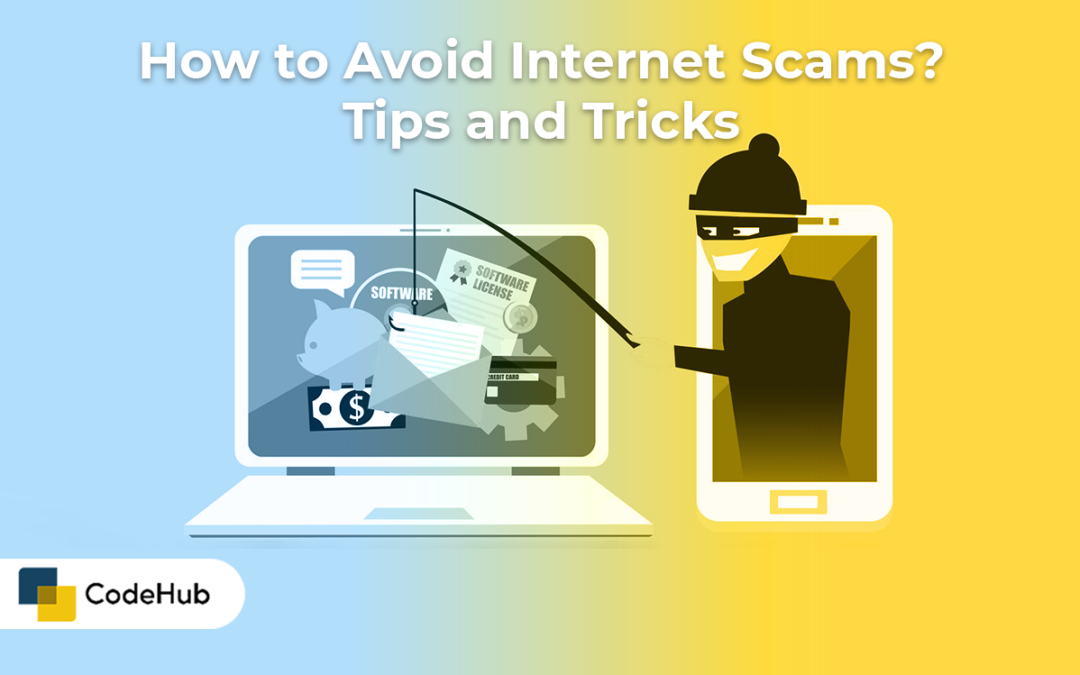The internet is a wonderful place to learn, communicate, and have fun. But it also has its dark side, where scammers lurk and try to trick you into giving them your money or personal information. Internet scams can take many forms, such as phishing emails, fake websites, online shopping fraud, lottery scams, and more. According to a government agency, Americans lost more than $3.3 billion to fraud in 2020.
So how can you protect yourself from falling victim to these online traps? Here are some tips and tricks to help you spot and avoid internet scams.
Tip #1: Be skeptical of unsolicited messages
One of the most common ways scammers try to lure you in is by sending you emails or text messages that pretend to be from a legitimate organization or person. They might claim to be from your bank, your utility company, your online payment service, or even a charity asking for donations. They might also use a fake name or logo that looks similar to the real one.
These messages often have a sense of urgency or a prize. They might say that your account has been compromised, that you owe money, that you have won a lottery, or that you need to confirm some personal or financial information. They might also include a link or an attachment that leads to a malicious website or downloads malware onto your device.
The best way to avoid these phishing scams is to be skeptical of any message that you weren’t expecting or that asks for your sensitive information. Don’t click on any links or open any attachments unless you are sure they are safe and trustworthy. If you are not sure, contact the sender directly using a different method, such as calling their official phone number or visiting their official website. Don’t use the contact information provided in the message, as it might be fake.
Tip #2: Don’t pay with unusual methods
Another way scammers try to get your money is by asking you to pay with unusual methods that are hard to trace or reverse. They might insist that you can only pay with cryptocurrency, wire transfer, gift card, payment app, or cashier’s check. They might also send you a check that turns out to be fake and ask you to send them money back.
These methods are often used by scammers because they are fast, anonymous, and irreversible. Once you send them money this way, it is very unlikely that you will get it back or be able to report them. Legitimate businesses and organizations will never ask you to pay with these methods.
The best way to avoid these payment scams is to pay with secure and familiar methods, such as credit card, debit card, or PayPal. These methods offer more protection and recourse in case of fraud. If someone asks you to pay with an unusual method, be very suspicious and don’t do it.
Tip #3: Do your research before buying or donating
Another way scammers try to trick you is by creating fake websites or ads that offer products or services that are too good to be true. They might promise you low prices, high quality, fast delivery, or free trials. They might also pose as charities or causes that appeal to your emotions and ask for your donations.
These websites or ads might look professional and convincing, but they are actually designed to steal your money or information. They might not deliver what they promised, charge you hidden fees, enroll you in unwanted subscriptions, or sell your data to other scammers.
The best way to avoid these online shopping and donation scams is to do your research before buying or donating anything online. Check the reputation and reviews of the seller or charity using trusted sources, such as consumer watchdogs, product testers, charity evaluators, or scam alert websites. Compare prices and features with other similar products or services. Read the terms and conditions carefully and look for any hidden fees or charges. Use a secure website that starts with https:// and has a lock icon in the address bar.
Tip #4: Keep your devices and accounts secure
Another way scammers try to access your information is by hacking into your devices or accounts. They might use malware, spyware, keyloggers, or other tools to infect your computer, smartphone, tablet, or other devices. They might also use brute force attacks, password guessing, social engineering, or other techniques to break into your email, social media, online banking, or other accounts.
These attacks can compromise your privacy and security. They can allow scammers to monitor your online activity, steal your identity, access your financial accounts, impersonate you, blackmail you, or harm your reputation.
The best way to avoid these cyberattacks is to keep your devices and accounts secure. Use strong passwords that are long, complex, and unique for each account. Use two-factor authentication whenever possible. Use antivirus software and update it regularly. Avoid using public Wi-Fi or computers for sensitive tasks. Be careful about what you download, install, or share online. Back up your data regularly.
Conclusion
Internet scams are a serious threat that can cost you money, information, and peace of mind. But by following these tips and tricks, you can reduce your chances of becoming a victim and protect yourself from online fraud. Remember to be skeptical, cautious, and vigilant when using the internet, and report any suspicious activity to the government agency or your local authorities. Stay safe and smart online!

